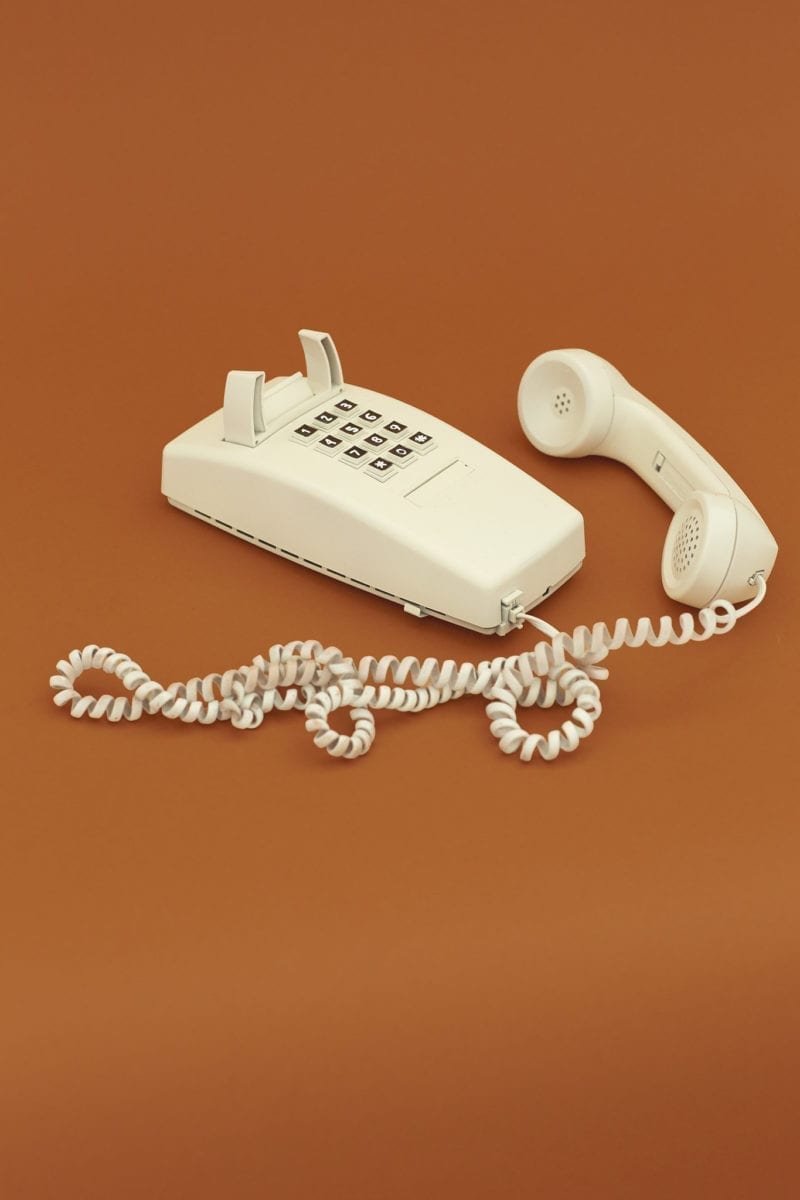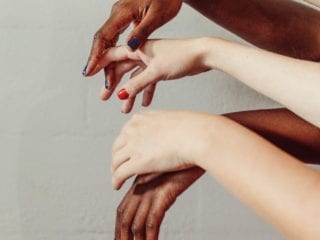At Darling, we stand for conversation.
We don’t stand for cancel culture. Or call-outs. Or public shaming.
Between COVID-19, the trauma around racism and the upcoming election, this is an incredibly challenging time in our culture. It is a hard time to be a person (or a business) navigating this climate. At Darling, we’re thinking about what our company can offer to help us learn to listen and view one another with kindness, dignity and respect.
At Darling, we stand for conversation.
Conversations require listening. When we listen, we acknowledge the inherent dignity and worth of another person. Listening acknowledges their experience, their existence and their pain. Listening does not mean we agree. Listening does not mean we condone. Listening does not mean legitimizing their choices. Listening means that we acknowledge there is a person sitting across from us, with real experiences and real dignity, and we respect their personhood enough to listen to understand.
Listening means that we acknowledge there is a person sitting across from us.
In conversations, we give up instant gratification. In conversation, there is nothing instant about it. Conversation requires a pause—a moment to reflect, think, ponder and be challenged. When Darling added the comma to our logo in 2018, we said the comma is “the invitation to conversation that we are sending out to each of you. All-in-all, [the comma is] a reminder that truth takes time, it takes relationship and it takes love.”
Conversation requires an understanding that we might be wrong—that we might have something to learn. I can think of so many things I believed 10 years ago that I’ve changed my mind about. Think back to 10 years ago. Have you changed your mind about any beliefs you held then? If you could go back in time to your previous self, would you berate and condemn her, call her out on social media or cancel her because she didn’t believe what you believe now?
No, you wouldn’t. You’d start a conversation with her.
When I consider the person I was 10 years ago, I am grateful for the many conversations that shaped the beliefs I have today. Conversations gave me new information and helped me draw new conclusions. Ten years from now, I think my future self will say the same thing; I will be grateful for the conversations that changed me.
I will be grateful for the conversations that changed me.
Our culture is broken. Over the last several years, the fissures in our society have begun cracking. Our ability to lean into deep conversations is crumbling. I scroll the comment sections of Instagram and Facebook and truly grieve the vitriol I see. We all come to the table with our own story, our own pain and our own experiences that we want to share. Yet, between the hateful comments and personal attacks, no one seems interested in hearing someone else’s story. I panic when I consider where the current trends will lead us. We grow so much when we engage people with different perspectives; what will happen to our communities if we don’t grow in that way?
I don’t even want to imagine who I will become if I’m not having deep conversations with people who challenge what I believe.
I don’t even want to imagine who I will become if I’m not having deep conversations with people who challenge what I believe.
There are people in my life whose views I’d like to change. I disagree about lots of things with my family, my friends, my acquaintances and my professional contacts. I’d like to challenge many of them on their views on money, race, politics and culture. Likewise, I know that there are people who love me who’d like to challenge my views on these issues.
In 2012, I sat in the McDonald’s in the basement of the Louvre in Paris with one of my best friends from college. We vote differently. We worship differently. We hold fundamentally opposed worldviews. We sat in that McDonald’s and ate french fries and argued vehemently about absolute truth for four hours. To this day, we are best friends.
Eight years later, it feels like the civil discourse in our country has disintegrated. Sometimes, I look around and wonder if friendships like this are even possible anymore. When I scroll through social media and see the call out culture at work, I am so scared to consider where this will lead us.
I don’t want the cancel, call-out culture to drive me into an echo chamber where I won’t be challenged. I don’t want the vitriol on social media to rob me of the opportunity to hear the personal experiences of others and how they arrived at their worldview. I don’t want to confine myself to staying the same person I am today in 10 years.
I don’t want the cancel, call-out culture to drive me into an echo chamber where I won’t be challenged.
My french fry Louvre best friend has listened as I reflect and worry about the state of conversation in our culture. For Christmas this year, I opened my gift—two Christmas tree ornaments, one of the Louvre and one of french fries. Those ornaments will hang on my Christmas tree forever, to remind me of the richness of a friendship where we disagree and we have conversation anyway.
At Darling, we stand for french fries in the Louvre. We stand against cancel culture. We stand for deep conversations between two inherently valuable people with opposing views on important matters. We stand for listening—truly listening—to another person’s story and experiences.
We stand for the truth that we all have something to learn. We hope you agree, and if you don’t, we’d love to listen and hear your thoughts. Let’s recover the art of conversation together.
What makes it so hard to engage in discussion with people who think or believe differently from you? What is something you can do to learn to listen better?
Image via Prakash Shroff, Darling Issue No. 14












17 comments
This is such a timely and beautiful and truthful article! Social media and the internet at large has become a rather disillusioning place as of late. Thank you for the reminder of what Listening truly is. And also for calling out the “cancel culture”. I don’t think shaming people into accepting our point of view ever brings about true change. I think it is crucial to not dehumanize others who don’t share the same point of view, politics, etc. On the other side of every comment, post, social media profile and the smart screen is a human being. I want to have conversations in a kind and humble way. I think the anger of others ( even though it may be very valid) can make it challenging to have hard conversations but if I remember they are a real person with real pain and that I can offer to help carry another’s burden even if I haven’t experienced the same things they have myself helps me to listen better. Thank you for brave and timely words, Virginia!
Thank you for reading Hannah! This part, “I remember they are a real person with real pain,” is vital to remember.
This is such good read and so necessary today. I hope that people will listen to each other and not attack one another simply because you have different opinions. I recall how I felt when Hilary Clinton referred to any Trump supporter as “Deplorable.” What a terrible and divisive comment to make about half of American citizens and it fueled so much hatred. There are many good people on both sides of the aisle who truly care about this Country, Justice and Equal Rights for All. WE all have so much to learn.
Reading this reminds me of another time before BLM fundamentally changed the way we talk about race in America. A time when we would gloss over the complexity and horror of our history to avoid the discomfort it caused us; and we would just “agree to disagree”. I think that was a time of silent crisis for many.
One of the best ways we can learn to listen better is to stop using dehumanizing language in conversation (e.g. thugs, illegals etc).
Then, we can acknowledge that some people’s beliefs are hurting people. If we can acknowledge the pain our beliefs have caused; we can grow and our beliefs will grow with us. Also, it is necessary to have safe spaces where we can have such hard conversations. Each of us, and I include myself, can and must make a safe space for such conversations if we are truthfully committed to recovering the art of conversation.
Hey Diana! Thanks for your thoughtful and kind comment. I thought a lot about what you said. I don’t want to harken back to a time before BLM, and I definitely don’t want to agree to disagree. My hope is that we can agree to engage in a thoughtful, kind and humble way, with an openness to changing our own beliefs and shedding the insistence that we change someone else’s. I know that the most important changes in my own mindset have come from conversations where the other person had gracious assumptions about my intentions and helped me process to get to a new conclusion. Acknowledging pain is so, so important and I agree it’s a critical part of listening. I agree our culture has to learn how to do that better. I wish you and I could go have coffee (do you live in Dallas?!) so I could hear about your experience with this kind of hard conversation. Thanks for writing— I’m going to be a more thoughtful writer from your input.
Thank you so much. My faith in humanity could have used a bit of a boost today.
This is truly wonderful and I will probably be suscribing to Darling now that I’ve read this–Virginia, your thoughtful, thought-provoking, and loving article is so great! Cancel culture scares and saddens me, and I think what fuels it the most is that we can all hide behind our screens. But, eventually, and already as we’ve seen, that starts seeping into real life and colors our view of how we interact with everyone else.
I often find myself scared of even starting a conversation with others; truly wanting to listen and swap ideas/perspectives, but being afraid that if I bring up what I think, then they’ll only see me in one light. But I think my own solution to this is to continue to press into real life conversation. Obviously this is hard with COVID19 but even calling and facetiming friends will work as well, and I think by being an encourager and proponent of deep, respectful conversations (where we may end up disagreeing) and reaching out to others to initiate these, I hope it’ll encourage others to in turn do the same.
So appreciate this! The greatest way to grow is to took advantage of the knowledge and experience that someone else has. That’s where understanding comes from! It’s hard, when everyone is focused on being right and enforcing rightness, to stay through the mess. But without conversation, we’ll never get to the root of the issue we’re trying to fix!
So true, Tara. We each have so much to learn from other people’s experience. We have to sit through the messy part to have honest conversation.
This is me standing up and cheering for ALL OF THIS! Thank you for writing this out. If we, as a society, are going to call anything toxic, it’s gotta be cancel culture. It is killing the conversation, killing our ability to learn and grow. We must give one another more grace or this nation is toast.
We are standing with and couldn’t agree more with this, “If we, as a society, are going to call anything toxic, it’s gotta be cancel culture.”
I love everything about this. Your conversation with your friend over French fries reminds me of conversations with my good friend over glasses of wine (all great conversations happen over food ;)). We are opposites in so many ways but I like hearing her side of things. I know we probably won’t change each other’s views… and that’s ok. We listen to each other and understand where the other person is coming from. At the end of the day we still love each other.
The best conversation always happen over a good meal!
This is wonderful!!
There aren’t truly that many things that should divide us. And even when standing for justice, most of the time there can be forgiveness and mercy.
If we really take the time to understand the heart of people, to truly SEE them, their decisions and actions and beliefs became way more clear. And while we may disagree about something, knowing why they believe what they do can really help a lot in bringing a disagreement to be just that. Not division, not hatred, not vitrol, but just a disagreement.
Love this point you made, “When standing for justice, most of the time there can be forgiveness and mercy.”
We all have a little something (or probably a lot of something) that we can learn from this article. We need to be reminded of how to listen, so that we can learn and grow.
We all have more to learn. So true, and there’s absolutely no shame in that.